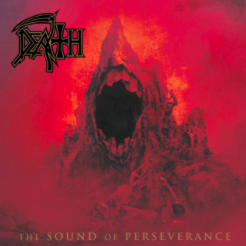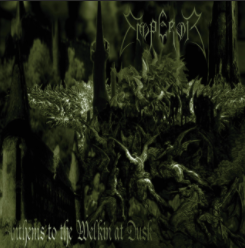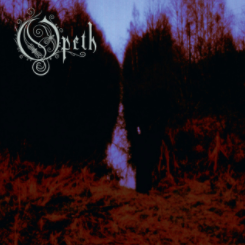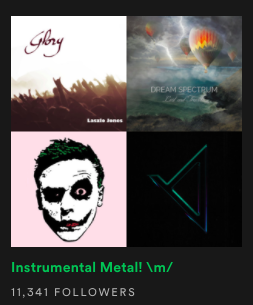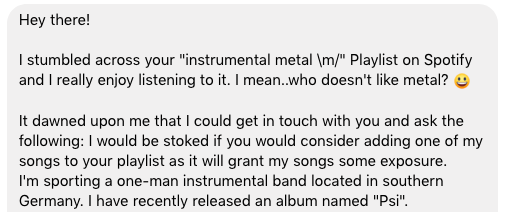The Surprising Story of the Instrumental Metal Playlist and My Metal Music Odyssey
When I was in high school, I received my first (and beloved) red and black special-edition U2 iPod. The dawn of iTunes enabled me to discover tons and tons of bands I had never listened to before. I would eagerly digest the iTunes “free singles of the week” and soon discovered that bands from many different genres were insanely appealing to me. From classic rock, (The Rolling Stones, Led Zeppelin, Pink Floyd) to indie rock (Kaiser Chiefs, Kasabian, The Mary Onettes), indie folk (Boy & Bear, Fleet Foxes) and 90’s rock (Oasis, Blur, Queens of the Stone Age) and so many more. That journey also introduced me to the genre of metal, something that deeply resonated with me. I didn't limit my tastes to the classic metal of Iron Maiden or Def Leppard, or newer influential bands like Ghost, but rather, I explored all the permutations and variations of the genre. And if you’re curious why it’s called “metal” in the first place, the term really comes from heavy metal, the kind of music that started with pioneering bands like Black Sabbath. They played intense, harsher, heavier sounding rock music than most popular hard rock. Their guitar work also incorporated far more intense distortion tones, giving it a uniquely metallic edge to the melodies. So what’s harder than rock? Well, metal! So heavy metal is the true overarching genre umbrella, and metal fans find enjoyment within a whole cornucopia of subgenres.
With my iPod in hand, and a desire to discover bands I had never heard of before, I quickly became accustomed to absorbing insane amounts of music, broadening my iTunes library, and following up on recommendations from friends. The idea that my next favorite band or a song that could change my life might be just around the corner was a driving force for me. There was never enough new metal music to discover, and my tastes started to evolve more and more.
Discovering metal takes time, and great friends to guide the way
When I went off to Stetson University for college and joined Delta Sigma Phi Fraternity, I met many kindred spirits in a few of my metal-enthusiast fraternity brothers. It was easy to bond over a shared love of intense music. Dave Glerum in particular, one of my best friends and brothers, broadened my metal horizons even further, especially with the black metal subgenre. During this time, I also started to love power metal (Sonata Arctica, Blind Guardian, etc.), and even though this wasn't quite Dave's jam, I still credit him with showing me that metal music can be both wide-ranging and inclusive, with so many different styles and blends of talent to appreciate. Throughout my freshman and sophomore years at Stetson especially, we'd recruit a solid group of brothers to go to metal shows in and around Orlando, like The House of Blues, and other smaller venues like The Social. There's nothing like standing in a small, intimate venue, watching a metal guitarist shred, and being up close and personal to see his fingers fly up and down the guitar’s fretboard—truly a sight to behold.
The many reasons to love the awe-inspiring soundscapes of metal
I've often pondered why exactly I love metal so much. It's not the ONLY genre I listen to, far from it, but it's one I can always find comfort and excitement in time and again. Certainly, it's not for everyone—my girlfriend, Erin, would be the first to tell you that. But if I had to distill down why metal is so appealing to me…it's because the music is complex; challenging; invigorating; fascinating; exhilarating; mysterious…and elusive. Metal music is deep and worthy of exploration. These musicians craft intricate melodies that are technically impressive, jaw-dropping, and explode with power. Another factor is the way the intensity of the music can mirror the intense emotions I may be feeling, but can't always express to the fullest degree. While heavy metal music to some is harsh, irritating, and obnoxious, to others like me, it is a welcome assault on the senses that is both cathartic and empowering. Over the years, my love of metal has only deepened, and I continue to discover new bands that push the boundaries of the genre to exciting new places. Recalling my early days of discovering metal music genuinely makes me smile and warms my heart. Even as I write these words, I feel a powerful sense of nostalgia thinking about how my discovery of music was intricately connected with growing up. Even better, that journey of discovery hasn’t stopped—it has just morphed over time.
After college, my metal music journey continued to evolve. I moved to New York City and was taking full advantage of the incredible concert venues the city had to offer. Virtually every metal band I wanted to see would make a stop in NYC—it was only a matter of time. I would carefully monitor tour schedules, all my concert tracker iPhone apps, and snag tickets whenever I could. I was working for a small startup in shared coworking space on Lafayette street just below Astor Place. Within the maze of walled-off office spaces, conference rooms, and coffee dispensers, I found myself hunkering down, realizing iTunes just wasn’t doing it for me anymore. I had heard about Spotify, which was relatively new at the time. It made all the sense in the world to sign up, and I began cataloging all of my music into curated playlists.
How discovering Spotify impacted my metal journey
Within a matter of days, I had nearly forgotten about my iTunes music. Spotify made it SO easy to discover new bands, see what friends were listening to, and make any kind of playlist imaginable. Given that I was working on a small team in a compact coworking space, I needed some invigorating music to keep me focused and energized, but not too distracted. It didn't take me long to realize that a metal playlist was what I needed—more specifically, an instrumentally-focused one. So, imagine me sitting in that small, fairly cramped coworking space in NYC, wide-eyed as I am diving headfirst into the wonders of building custom playlists on Spotify. I really needed to dig deep, think back to past favorite bands, songs, and create something that would give me a regular boost during the workday.
Compiling the world's best instrumental metal music in one playlist is no easy task
I decided early on in this journey that I needed an awesome metal playlist. Perhaps one that focused on instrumental metal would be energizing for work—not having vocals could help me focus a bit better for work. The vocals aspect was an important criterion, especially since to start with – the vocals of metal bands really has determined which bands I gravitated towards, or avoided completely. One trend of my exploration of the genre has been that I am not a huge fan of screaming/growling vocals. They just don't do it for me—they are grating to my ears, and draw my focus away from the music. But in some cases, some songs are just so good that I can deal with a few segments of growling vocals (especially with a band like Opeth) but more often than not, I gravitate towards clean vocals. When I mentioned this to Dave in college, he told me that many metal bands, especially black metal bands like Opeth, do in fact have songs with clean vocals, and even instrumental tracks. One instrumental song in particular, "Madrigal," hit me instantly. The song sounds like the foreboding anticipation of a massive thunderstorm, one that is utterly hopeless to escape from. It's incredibly dark, technically brilliant, and it captures a unique melancholic mood. Another absolutely killer instrumental track from Opeth is "Epilogue"—one that still to this day absolutely mesmerizes me. It sounds like a metal reincarnation of Pink Floyd.
Dave would often point me to awesome instrumental tracks of some of his beloved metal bands that usually focused on brutal, growling vocals, knowing I wasn't a fan of the vocal style. Another was "Voice of the Soul," by the band Death, a pioneer in the death metal genre. "The Wanderer," by the massively influential Emperor, was another great example. That instrumental has stayed with me for a long time, and I continually listen to it. These few incredible tracks were the building blocks of the playlist and still are among the standout songs, in my opinion.
Based on the date of tracks added to the playlist, I started this on July 19th, 2012, and I named it simply "Instrumental Metal! \m/" The playlist started small—I added some of the tracks I mentioned above, and a few others that had become my "go-to" instrumental metal tracks. Then, I started doing a ton of research. Of all the awesome metal bands out there—did they have instrumental tracks I didn't know about? What about bands I thought I didn't like—did they have songs that would completely alter my opinion of them? What incredible bands are out there that I have yet to discover? The scope of my playlist exploded: my initial 25-track playlist soon ballooned into a hundred. I kept adding more and more each day, finding different blogs, forums, and ranked lists all over the internet. If a track sounded good to me, onto the playlist it went. It wasn't organized in any particular way, but I wanted to capture as many as I could that were of actual quality.
Metal enthusiasts around the world discover my playlist
It was only a few weeks after first creating the playlist that I started to notice the subscriber number creeping up. It started small, but after a few weeks, and a few months, it seemed that every time I opened on Spotify and checked my profile, the subscriber count would increase. None of my other playlists were garnering anything close to this level of attention. I certainly wish I had kept track of how it was increasing, but it seemed there were people around the country and world that were finding both utility and enjoyment in what I created, which was extremely gratifying. As I write these words, the total subscriber count is up to 11,345. It doesn't sound like all that much, but to me, seeing the growth over these years to a playlist I started as just something for my own personal enjoyment is pretty amazing, and I'm incredibly proud of it.
It's wild to think that when I add the occasional track to the playlist or throw on an entire instrumental album on there, more than eleven thousand people are notified. I think it's the coolest thing, and it just gives me that warm and fuzzy feeling, knowing that there are people out there that share my musical tastes, and find that instrumental metal speaks to them in a myriad of ways. I also marvel at the fact that the playlist continues to rank among the top results when you search “instrumental metal” on Spotify.
The enduring popularity of the playlist keeps me invested, and ensures that I never forget about it or neglect it. That’s far more than I can say for many other playlists I have created over the years on Spotify. I also discovered other versatile uses for it beyond the work grind. It became a quick favorite for commuting on the subway or working out at the gym.
Over the years, I have done periodic updates to the playlist but I haven't exactly cleaned it out or culled certain tracks I don't listen to as much; I look at it more as an ongoing project where I try to contribute anything I think is really worth alerting the subscribers about. After a few years went by, I would still check in on it from time to time, but it invariably fell farther down my growing group of playlists. However, my interest surged again starting about three years ago, and oddly enough, it's all thanks to Facebook.
Instrumental metal bands find out how to reach me - and I respond
Starting around mid-2017, when the playlist subscriber count was solidly in the thousands, I began receiving out of the blue Facebook Messenger requests from people I didn’t know. These requests are not as obvious to find, and they are easy to forget when they go unread, but when I finally found the first batch, I was floored. I felt a bit guilty as well, since at first so many of these messages were stuck in the limbo of message requests, and I had a backlog to work through! These messages in my Messenger inbox are all from up-and-coming metal bands who love my playlist, and are working on new instrumental metal music themselves that they want me to listen to, and hopefully include on the playlist!
The idea that these bands perceive that getting their tracks on my playlist could help their band boost exposure, attract new listeners, and raise their profile awareness is awesome to me, and at first, it was a big surprise. My profile on Spotify is linked to my Facebook account, and these enterprising bands apparently search "Chris Fay" on Facebook and match my profile pictures from Spotify and Facebook to reach out. My first step is to check out many of these bands profiles on Spotify, and some of them might have maybe a few thousand subscribers or track streams. Perhaps if enough people who listen to my playlist engage with these new songs and share them with friends, it could be a catalyst to help these bands grow.
To be clear, it’s not like I’m drowning in Facebook message requests from metal bands all the time, but nevertheless, the volume of messages remains consistent—roughly a handful per week. It ebbs and flows, of course, but engaging with these messages has become a regular part of my routine whenever I pull up Facebook Messenger. Although I’m not able to get to every message, I do make a concerted effort to decide if the instrumental metal songs are a fit for the playlist. One big criterion for me is whether or not the 11,000+ subscribers on my playlist will dig this track. I often correspond with the bands and let them know that I like the songs, and in many instances, tell them I will add their track(s) to the playlist. A lot of band members I speak to tell me of their plans to share my playlist with their own followings, friends, and fans, which I'm sure also has helped fuel its growth as well. To this day, the messages keep rolling into my Facebook Messenger inbox, and I encourage any bands out there that create remarkable instrumental metal music to reach out to me!
One of the best interactions I had was with the frontman of Dead Like Juliet, a fantastic metal band on the rise in northern Italy. I liked their exhilarating track “Wanderer” so much, I put it at the very top of the playlist to maximize their visibility. When they came out a few months later with a new all-instrumental album, I added it in its entirety. The band was super appreciative of having their songs near the top, and I decided this is something I should do across the board when an amazing band asks for my help.
Doing my small part to help up-and-coming metal bands
I'm certainly no metal expert—only a dedicated fan, but if I can devote the first few tracks of my playlist to newer bands that are beginning to making a splash on the metal scene, from around the world, then I know I’m helping enhance their exposure. Perhaps even some of my long-time playlist subscribers will become devoted new fans of these bands!
One band in particular, The Last Cell, wrote me back a few months later and let me know that he indeed saw a boost in subscribers and streams on Spotify. Here's what he said:
Reflecting on these last few years makes me want to see how these bands are doing; if they've seen any kind of bump in exposure, gained new listeners, or even boosted their streams. What's also been fun about this process for me is that it continually fuels my discovery of new bands that are breaking the mold and redefining what instrumental metal music can be. My playlist was designed as a compilation of all the greatest instrumental metal songs that are already popular and widely appreciated, but now, the playlist has consciously transformed into a delivery vehicle for the newest, freshest instrumental metal on Spotify.
My love of instrumental metal won't fade, and neither will my commitment to this playlist—I even listened to some of my favorites as I wrote this post! It's a small project, but I'm glad it's made some small impact within the community at the intersection of metal musicians and Spotify listeners. If you've made it to the end of this story, thank you—and I encourage you to check out the playlist . Even if you don’t consider yourself an explicit metal fan, these kinds of instrumental tracks really do have a unique power, atmosphere, and feeling that is unlike anything else in music.

